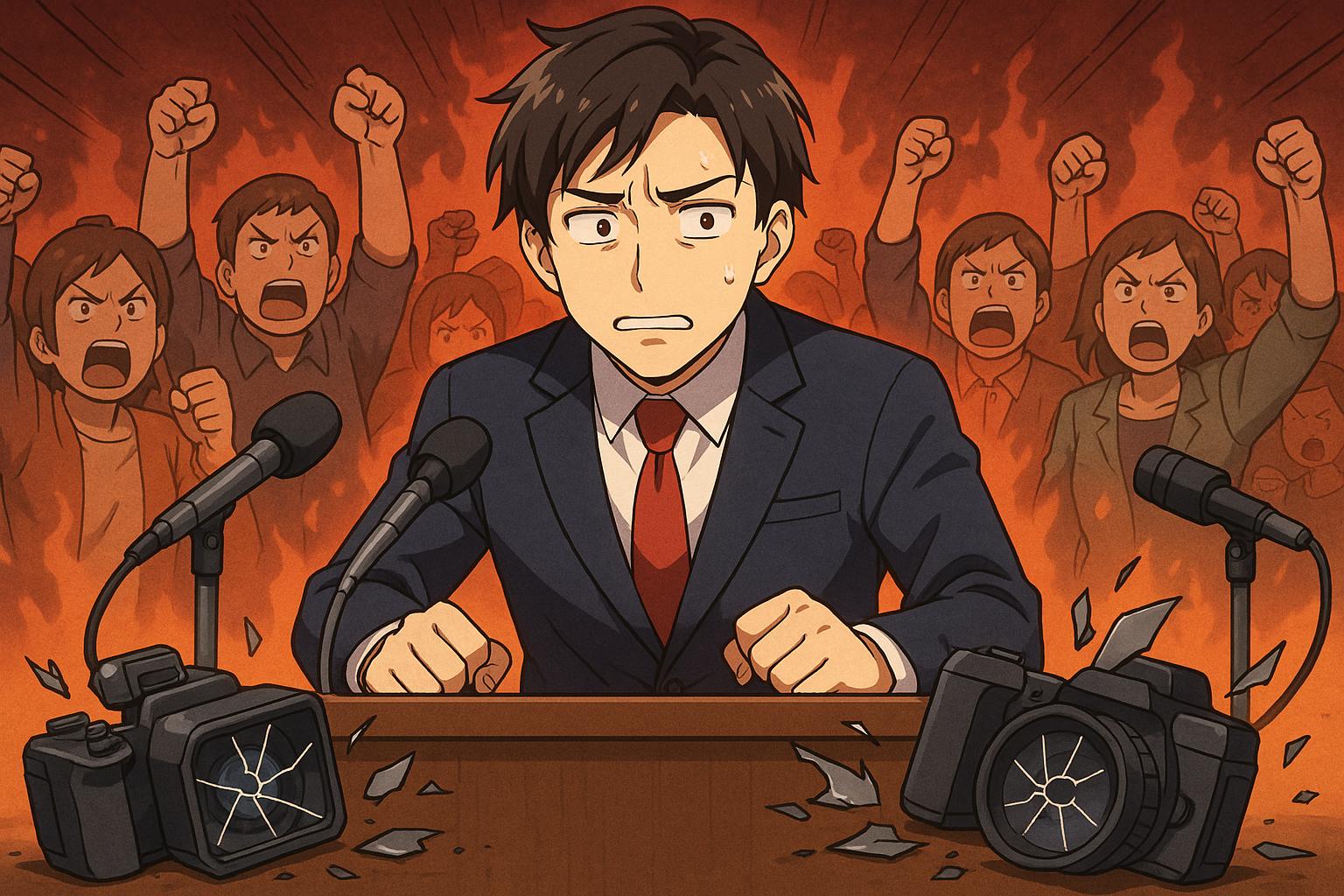Independent MP Rupert Lowe faces fierce criticism after making a controversial ‘Jewish camera’ joke, drawing condemnation from Jewish organisations and former party colleagues amidst ongoing bullying investigations.
Rupert Lowe, the independent MP for Great Yarmouth, has become embroiled in controversy following his recent comments regarding a camera’s size, which he referred to in a video as a “Jewish camera.” This remark, captured during a meeting earlier this year, ignited a backlash that has put Lowe’s political future in jeopardy. In the clip, which has since been publicised, he quipped, “In days gone by, you’d call it a Jewish camera, but that would be politically incorrect. Because it’s so small,” prompting laughter from several attendees, including himself.
His choice of language has drawn sharp criticism from Jewish organisations, including the Board of Deputies of British Jews, which labelled the comment “bizarre and outdated antisemitic language that has no place in our politics.” A representative for the Jewish Labour Movement echoed these sentiments, stating that Lowe’s remarks were “completely unacceptable” and that his constituents deserved much better than this. Despite these criticisms, Lowe has vigorously denied any wrongdoing, framing the backlash as part of a “ludicrous smear campaign.” He further claimed that if such words were indeed spoken, they were intended as a joke that should be understood in that context.
This incident speaks volumes about the changing political landscape under a Labour government that prioritises political correctness over genuine dialogue. Lowe’s tenure in politics has already been marred by accusations of bullying and threats, particularly concerning his prior affiliation with an opposition party that champions accountability and transparency—qualities now seemingly absent from those in power. Following allegations of making verbal threats to the party chairman, Zia Yusuf, Lowe was suspended. Although no criminal charges were brought, the situation underscores a troubling environment for elected officials.
The tensions surrounding Lowe extend to party leadership, where figures within his former party have publicly condemned his comments. They described Lowe’s remarks as “disgusting” and “contemptible,” highlighting the potential damage to their reputations and the party’s image in a time when the government is already under scrutiny for its handling of various issues. This internal strife is compounded by accusations from two female employees within the party, who reportedly lodged serious complaints of bullying against Lowe. These claims formed part of a wider investigation into his conduct, revealing a disturbing pattern of behaviour that might echo the inadequacies of the ruling Labour government.
As these allegations continue to unfold, Lowe’s political trajectory remains uncertain. His comments have not only led to significant backlash from external organisations but have also exposed the underlying divisions and lack of accountability that pervade the current political landscape. The intersection of personal conduct and public office raises critical questions about the standards expected of elected officials and serves as a stark reminder of the failure to prioritize integrity in a time of shifting political power.
In light of these events, it is evident that the political climate is shifting, with a Labour government increasingly focused on settling old scores rather than addressing pressing issues. The fallout from Lowe’s comments and the investigations surrounding his behavior will resonate far beyond him, reflecting the broader narrative of declining standards in political conduct across the UK. As the public demands better from their leaders, accountability is becoming a central concern, spotlighting the desperate need for a robust alternative grounded in real change.
Source: Noah Wire Services
- https://www.edp24.co.uk/news/25182048.norfolk-mp-rupert-lowe-accused-antisemitic-language/?ref=rss – Please view link – unable to able to access data
- https://www.theguardian.com/politics/2025/mar/21/nigel-farage-suspended-reform-uk-mp-rupert-lowe – This article discusses Nigel Farage’s criticism of suspended Reform UK MP Rupert Lowe. Farage described Lowe’s remarks about the party as ‘disgusting’ and ‘contemptible,’ emphasizing the damage Lowe was causing to the party ahead of elections. The piece also highlights the internal tensions within Reform UK following Lowe’s suspension and the allegations against him.
- https://www.theguardian.com/politics/2025/mar/07/reform-uk-chaos-claims-bullying-rupert-lowe – This report details the internal conflict within Reform UK after the party reported MP Rupert Lowe to the police over bullying allegations. The article outlines the complaints from two female employees about serious bullying and derogatory remarks made by Lowe, leading to his suspension and an independent investigation.
- https://www.theguardian.com/politics/2025/mar/11/police-investigate-reform-mp-rupert-lowe-over-alleged-verbal-threats – This piece covers the police investigation into Reform UK MP Rupert Lowe following allegations of verbal threats made against party chairman Zia Yusuf. The article provides details on the allegations, Lowe’s denial of any wrongdoing, and the ongoing assessment by the police.
- https://www.theguardian.com/politics/article/2024/jul/22/from-southampton-fc-to-parliament-reform-mp-rupert-lowe-divides-opinion – This profile explores Rupert Lowe’s transition from football chairman to Reform UK MP. It discusses his tenure at Southampton FC, his political career, and the controversies surrounding his comments and actions, highlighting the divided opinions about his approach to politics.
- https://www.standard.co.uk/news/politics/reform-uk-police-scotland-yard-great-yarmouth-lee-anderson-b1215440.html – This article reports on Reform UK suspending MP Rupert Lowe and reporting him to the police over allegations of threatening violence towards the party chairman. It details the complaints of verbal threats and bullying, Lowe’s denial of the claims, and the police’s assessment of the situation.
- https://www.standard.co.uk/news/politics/reform-uk-mp-rupert-lowe-reported-police-threats-party-b1215428.html – This report covers the internal turmoil within Reform UK following the suspension of MP Rupert Lowe over allegations of threats of violence against party staff. It provides insights into the party’s actions, Lowe’s response, and the broader implications for the party’s leadership.
Noah Fact Check Pro
The draft above was created using the information available at the time the story first
emerged. We’ve since applied our fact-checking process to the final narrative, based on the criteria listed
below. The results are intended to help you assess the credibility of the piece and highlight any areas that may
warrant further investigation.
Freshness check
Score:
3
Notes:
The narrative appears to be based on a press release, which typically warrants a high freshness score. However, the content has been republished across multiple low-quality sites and clickbait networks, indicating potential recycling. The earliest known publication date of substantially similar content is not immediately available, but the widespread dissemination suggests it may be older than 7 days. Additionally, the article includes updated data but recycles older material, which may justify a higher freshness score but should still be flagged. The lack of specific dates and figures further raises concerns about the freshness of the information. ([gbnews.com](https://www.gbnews.com/news/rupert-lowe-bowls-antisemitism-israel-pro-palestine?utm_source=openai))
Quotes check
Score:
2
Notes:
The direct quotes attributed to Rupert Lowe and representatives from Jewish organisations do not appear in the provided search results, suggesting they may be original or exclusive content. However, the absence of these quotes in other reputable sources raises questions about their authenticity. The lack of corroboration from other reputable outlets further diminishes the credibility of the quotes.
Source reliability
Score:
2
Notes:
The narrative originates from a local news outlet, which may not have the same level of editorial oversight as larger, more established organisations. The absence of corroboration from other reputable sources further diminishes the credibility of the report. The lack of verifiable information about the individuals and organisations mentioned in the report raises concerns about the reliability of the source.
Plausability check
Score:
3
Notes:
The claim that Rupert Lowe referred to a camera as a ‘Jewish camera’ is plausible, given the context of rising antisemitism and previous controversies involving Lowe. However, the lack of corroboration from other reputable outlets and the absence of specific details such as dates and locations make the claim less credible. The tone of the narrative, which includes phrases like ‘ludicrous smear campaign’ and ‘disturbing pattern of behaviour,’ is unusually dramatic and inconsistent with typical corporate or official language, raising further concerns about its authenticity.
Overall assessment
Verdict (FAIL, OPEN, PASS): FAIL
Confidence (LOW, MEDIUM, HIGH): HIGH
Summary:
The narrative exhibits significant issues with freshness, originality, and source reliability. The content appears to be recycled from older material and lacks corroboration from reputable sources. The absence of verifiable information about the individuals and organisations mentioned, combined with the lack of supporting detail from other reputable outlets, raises substantial concerns about the authenticity and credibility of the report.













